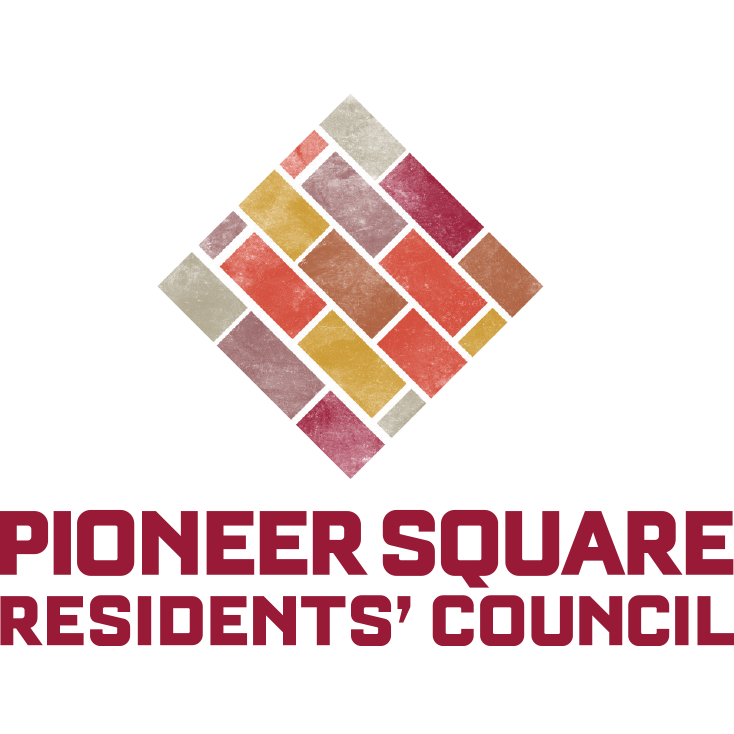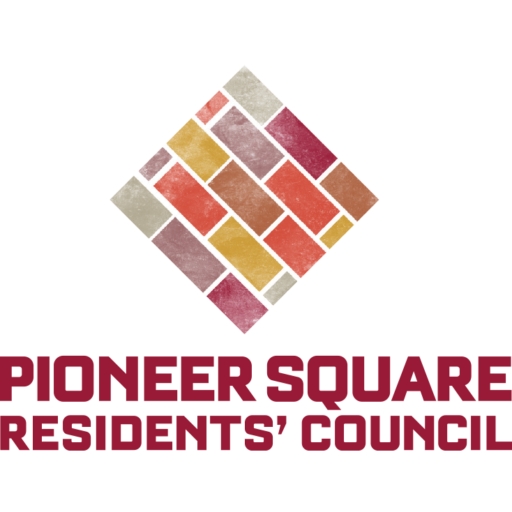14 Jan Drug busts, homelessness, and a positive outlook
Part 2
On Tuesday, I wrote some insights to what the police do in Pioneer Square and some of the general problems our neighborhood faces. Today, I’m writing about the exciting part of the ride along: catching the bad guys.
After chatting in the coffee shop, Sgt. Hancock and I headed over to the Smith Tower to (hopefully) participate in a drug bust. People complain about the presence of the police on the street and how that would make visitors and residents feel safer. While I don’t dispute that, here’s an example of where it’s better that they were not seen.
 One member of the bike squad, Frank, was in the Smith Tower with binoculars, while another member was in Masins, both watching… (drum roll)… the Lazarus Day Center and Fortson Square. Apparently the city prosecutor has requested that before anyone is arrested for anything drug related, that they are observed making three contacts (or three drug deals).
One member of the bike squad, Frank, was in the Smith Tower with binoculars, while another member was in Masins, both watching… (drum roll)… the Lazarus Day Center and Fortson Square. Apparently the city prosecutor has requested that before anyone is arrested for anything drug related, that they are observed making three contacts (or three drug deals).
In the Smith Tower, Frank paced between one spot and another, trying to get the best vantage point on all of the action down below. They communicated through radio with the rest of the squad, calling the drug dealers, buyers, and homeless by name (which was very impressive). At one point, there was a dealer in the square that they had heard was kicked out of Belltown the previous day for dealing. When I asked them how they knew it was him specifically, they said that he was wearing the same pants as yesterday (which were covered in iron-on sports logos).
I don’t know how many of you have noticed, but drug activity has exploded at Lazarus/Fortson Square –hereafter called “The Corner” (and decreased in Occidental and Chinatown). The police believe this is due to a few factors:
- Lazarus has had a cut in funding — as a result, they’ve reduced the security officer’s hours from 2-6pm
- Even when there is a security officer on staff, police have been told that the dealers have been paying off the security guard
I know that this may make some people angry, but there are problems at the Lazarus Day Center. I have no problem with services provided to the homeless. I have a problem when my neighborhood is overrun with drug dealers that are targeting the recovering addicts in and in front of the Lazarus and the Day Center does nothing.
This isn’t just opinion — it’s a fact that it’s happening. The Lazarus Day Center is only supposed to be for homeless men and women over the age of 50. According to their website, “the Center opened in July 1990 to serve this special population of elderly people who are vulnerable to the weather, street predators, and illness.” But there’s a problem: Lazarus is freely letting the predators into their center.
The police conducted another “drug bust” on the Corner last week — one of the people they arrested was down in the center with the other individuals. Was he homeless? No. Was he over the age of 50? No, he was 19. Did he belong there? Absolutely not. And this just keeps on happening.
According to the bike squad, the employees there didn’t seem to care about what was happening on the Corner, or in the center. I’m going to try and start a dialogue with the Catholic Community Services to see how they feel about all of this.
So, back to the actual ridealong — after observing the action for about 20-30 min, they had all of the information they needed and the squad headed to the Corner to make some arrests. I was given the option to stay in the car, but chose to tag along and see how the dealers/users reacted. As they approached, no one ran (as I expected them to… too many tv shows), but just stood there and denied that they had been dealing or using.
As someone on the outside, the bike squad had great chemistry together and seem to be really effective at what they do. They questioned the drug dealers/users, asked them if they had drugs on them, or had been dealing any drugs (of course, they all answered “no”) and then disbelief that they were being arrested turned to indignation as they asked over and over again “Are you really arresting me? Are you really arresting me, man? I wasn’t doing nothing!” To which Frank responded “Yes, we’re really arresting you — we watched you deal drugs. And we’re going to keep arresting you until you stop.”
 The third part of the title, “a positive outlook,” comes from the knowledge that these guys really know their stuff. They are out in our neighborhood every single day, watching what’s going on, making arrests when they can; they notice when things change, or when there are people there that don’t belong; they know people by name. And not just the drug dealers — they know the homeless that have been around, they interact with the business owners and to get to know them, and they’re always willing to stop and talk with the residents/office population. And although it sounds cheesy, they really care about making a difference in the downtown core.
The third part of the title, “a positive outlook,” comes from the knowledge that these guys really know their stuff. They are out in our neighborhood every single day, watching what’s going on, making arrests when they can; they notice when things change, or when there are people there that don’t belong; they know people by name. And not just the drug dealers — they know the homeless that have been around, they interact with the business owners and to get to know them, and they’re always willing to stop and talk with the residents/office population. And although it sounds cheesy, they really care about making a difference in the downtown core.
Near the end of the ride along, Sgt. Hancock got out of the car to talk to one individual that they’d been watching earlier in the shift. He said that he had a wife and a house in U-district, and freely admitted that he had just done some crack (but had nothing on him, so he couldn’t be arrested). His wife had given him $5 for drugs, but he didn’t want to go home, and was instead heading over to the Union Gospel Mission for a free meal.
As he finished the conversation, Sgt. Hancock told him to head back to his home in the U-District immediately after and that he didn’t want to see him in the neighborhood at all for the rest of the day. When he got back in the car, he joked that he didn’t want to tell him to go home because it was sending him back to his own neighborhood.
But on their shifts, they’re proactively arresting people for drug use/dealing, stopping suspicious people on the streets, and being aware of everything going on in the neighborhood.
Final message — if you see a drug deal or what looks like a drug deal, or drugs being used: Call 911. I know it seems pointless because the deals are so fast and the cops won’t make it in time anyways, but it helps the higher-ups (who determine where to allocate resources) know which areas are experiencing problems. Plus, the 911 operators are excellent – I visited the precinct this week and saw the operating center where all of the calls come in. Captain Brown said that they work 8 (very stressful) hours, but that they have excellent staff and leadership. We call 911 almost every day now – the 911 operators are very friendly and patient and make it easy to report drug deals in the neighborhood.
If you have information regarding drugs in the neighborhood, or want to share any concerns, there are a few (non-emergency) things you can do:
- Email Sgt. Paul Gracy (of the Community Police Team): paul.gracy@seattle.gov
- Email the Bike Precinct: SPD_West_Precinct_BikeBeats@Seattle.Gov
- Email safety@pioneersquare.org
One thing is for sure: the more information the police have, the better they can serve the community.






Pingback:The New Pioneer Square- Street Vendors, Public Safety and Revitalizing Pioneer Square – Blog Title
Posted at 09:39h, 11 March[…] created a positivity and excitement about Pioneer Square. Whenever I get discouraged about the loitering and drug problems in front of my building, I remember all of the incredible people that are working really hard in […]
Venita Graham
Posted at 10:52h, 29 AugustSince this problem is not going away and marijuana is legalized, why not just let it be truly legal like it is in Amsterdam? I’ve been there and it seems that making safe places to purchase drugs (which are taxed for societies benefit) takes a lot of the danger and ugliness out of it. Why waste police and jail time on minor drug offenders? Locking up everyone who smokes is simply not viable. Hard drugs like heroin or meth, which cause violent crime in order to maintain a habit, should still be prosecuted. But instead of throwing these perps in jail, how about creating a rehab ‘jail’ system designed specifically for them?
Pingback:Public Works: Are Alleys the Answer for Urban Renewal? | cityscape | Torontoist
Posted at 08:18h, 28 January[…] But, in spite of a growing population of yuppie-fied loft dwellers, Pioneer Square is still home to poverty and drug addiction. It also happens to be a federally and locally protected historic district, thanks to its […]